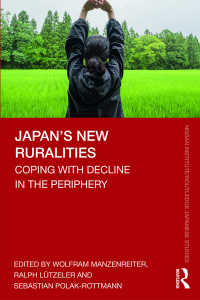日本の農村の再生:衰退に立ち向かうJapan’s New Ruralities Coping with Decline in the Periphery : Coping with Decline in the Periphery
(Nissan Institute/Routledge Japanese Studies)

Full Description
Seeking to challenge negative perceptions within Japanese media and politics on the future of the countryside, the contributors to this book present a counterargument to the inevitable demise of rural society.
Contrary to the dominant argument, which holds outmigration and demographic hyper-aging as primarily responsible for rural decline, this book highlights the spatial dimension of power differences behind uneven development in contemporary Japan. Including many fi eldwork-based case studies, the chapters discuss topics such as corporate farming, local energy systems and public healthcare, examining the constraints and possibilities of rural self-determination under the centripetal impact of forces located both in and outside of the country. Focusing on asymmetries of power to explore regional autonomy and heteronomy, it also examines "peripheralization" and the "global countryside," two recent theoretical contributions to the fi eld, as a common framework.
Japan’s New Ruralities addresses the complexity of rural decline in the context of debates on globalization and power differences. As such, it will be of interest to students and scholars of sociology, anthropology, human geography and politics, as well as Japanese Studies.
Table of Contents
1. Introduction: Japan’s new ruralities, Ralph Lützeler, Wolfram Manzenreiter and Sebastian Polak-Rottmann
Part 1: ransformations in the primary sector
2. From agribusiness to deer hunter: "Placing" food industrialization and multispecies health in Tokachi, Hokkaido,
Paul Hansen
3. Corporatization as hybridization in rural Japan: The case of Iwasaka in Shiga Prefecture, Kiyohiko Sakamoto and Haruhiko Iba
4. Sea pineapples in troubled waters: On the local-global interdependencies of the sea squirt (hoya) industry in the aftermath of the 3.11 disaster, Johannes Wilhelm
5. Reclaiming the global countryside? Decline and diversification in Saga Genkai coastal fisheries, Sonja Ganseforth
PART 2: Political innovations in rural Japan
6. Local renewables: Japan’s energy transformation and its potential for the remaking of rural communities, Thomas Feldhoff and Daniel Kremers
7. Empowering rural cooperation: Effects of agricultural policy intervention on rural social capital, Shinya Ueno, Toshiki Ōsuga and Wolfram Manzenreiter
8. Sustaining healthcare in Japan’s regions: The introduction of telehealth networks, Susanne Brucksch
9. Regional revitalization as a contested arena: Promoting wine tourism in Yamanashi, Hanno Jentzsch
PART 3: New residents in the countryside
10. Has the island lure reached Japan? Remote islands between tourism boom, new residents and fatal depopulation, Carolin Funck
11. Fluidity in rural Japan: How lifestyle migration and social movements contribute to the preservation of traditional ways of life on Iwaishima, Shunsuke Takeda
12. Nai mono wa nai—Challenging and subverting rural peripheralization? Decline and revival in a remote island town, Ludgera Lewerich
13. Embracing the periphery: Urbanites’ motivations for relocating to rural Japan, Cornelia Reiher
PART 4: Conceptual interventions for a new understanding of rural Japan
14. Reinventing rurality: Hybridity and socio-spatial depolarization in northern Japan, John W. Traphagan
15. Rereading the changing Japanese rural peripheries: New approaches and actors for the future, Tolga Özşen
16. Environmental activity gaps and how to fill them: Rural depopulation and wildlife encroachment in Japan, John Knight
17. Epilogue: Think global, act peripheral in Japan’s new ruralities, Sebastian Polak-Rottmann, Ralph Lützeler and Wolfram Manzenreiter

